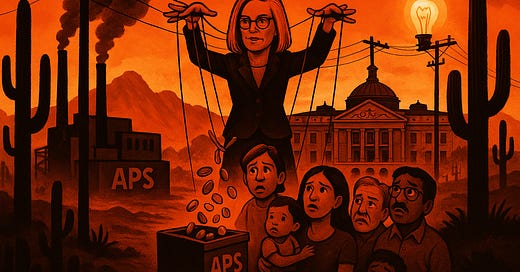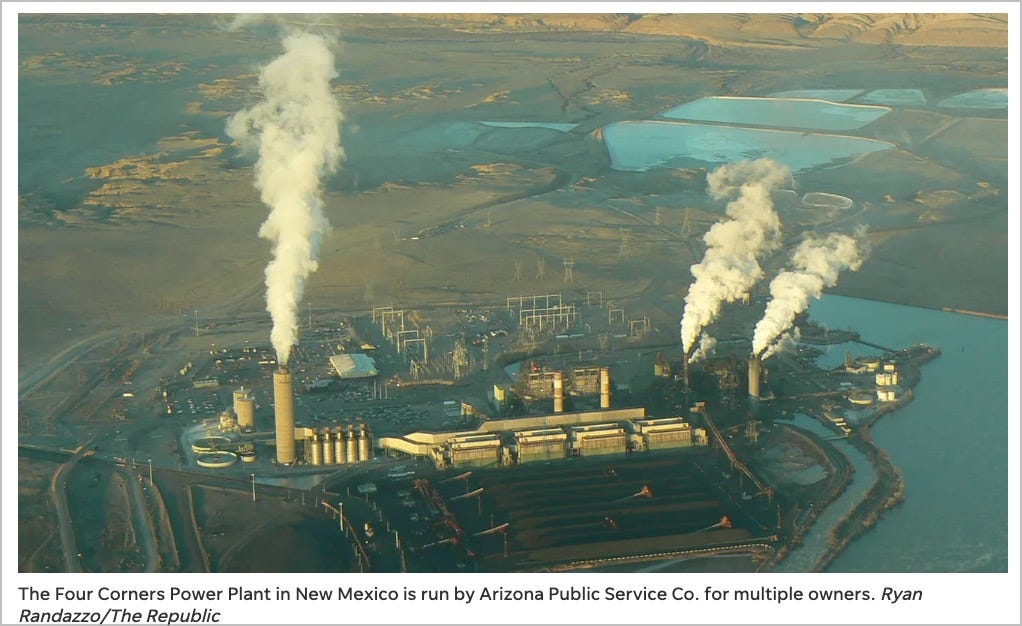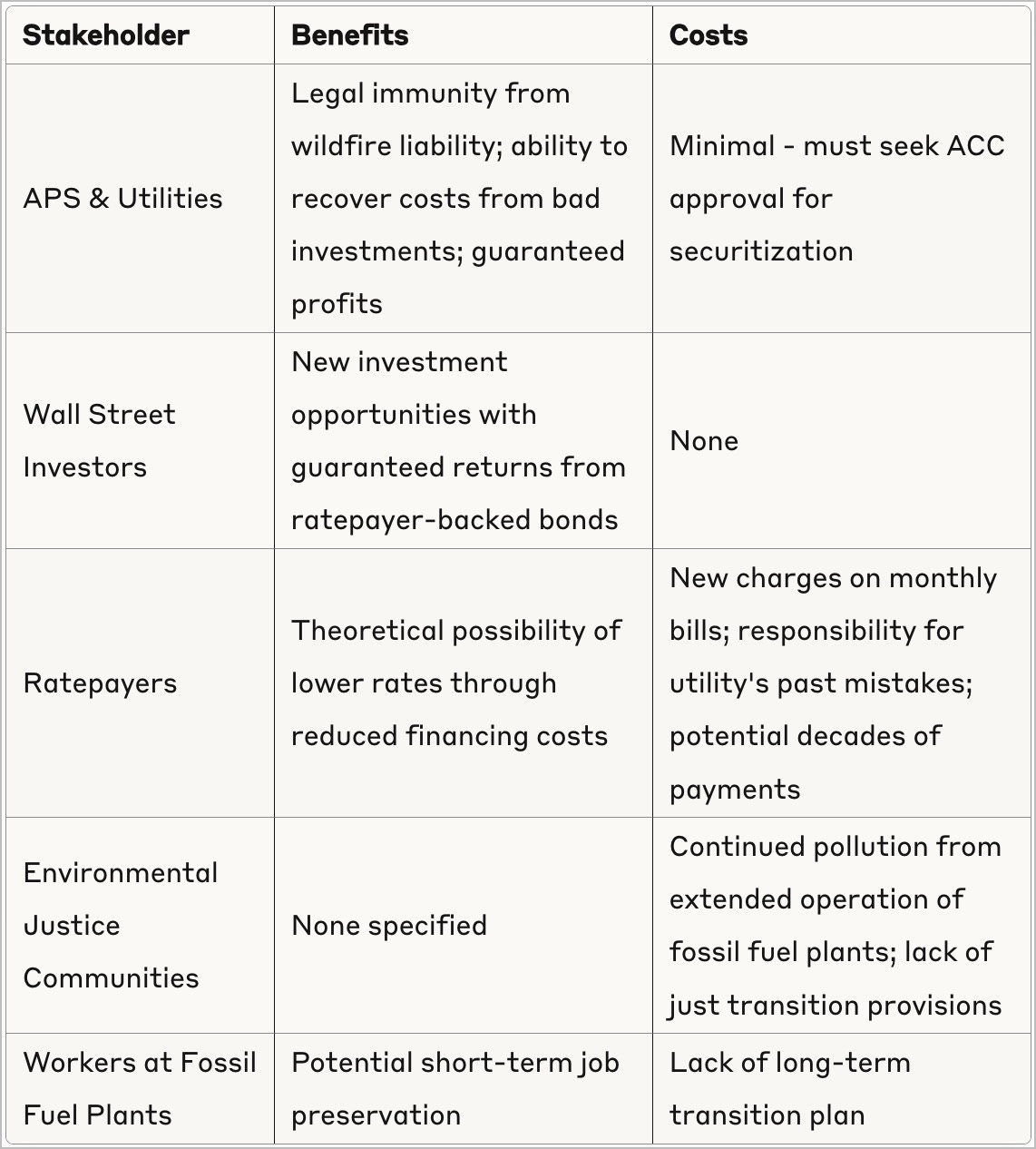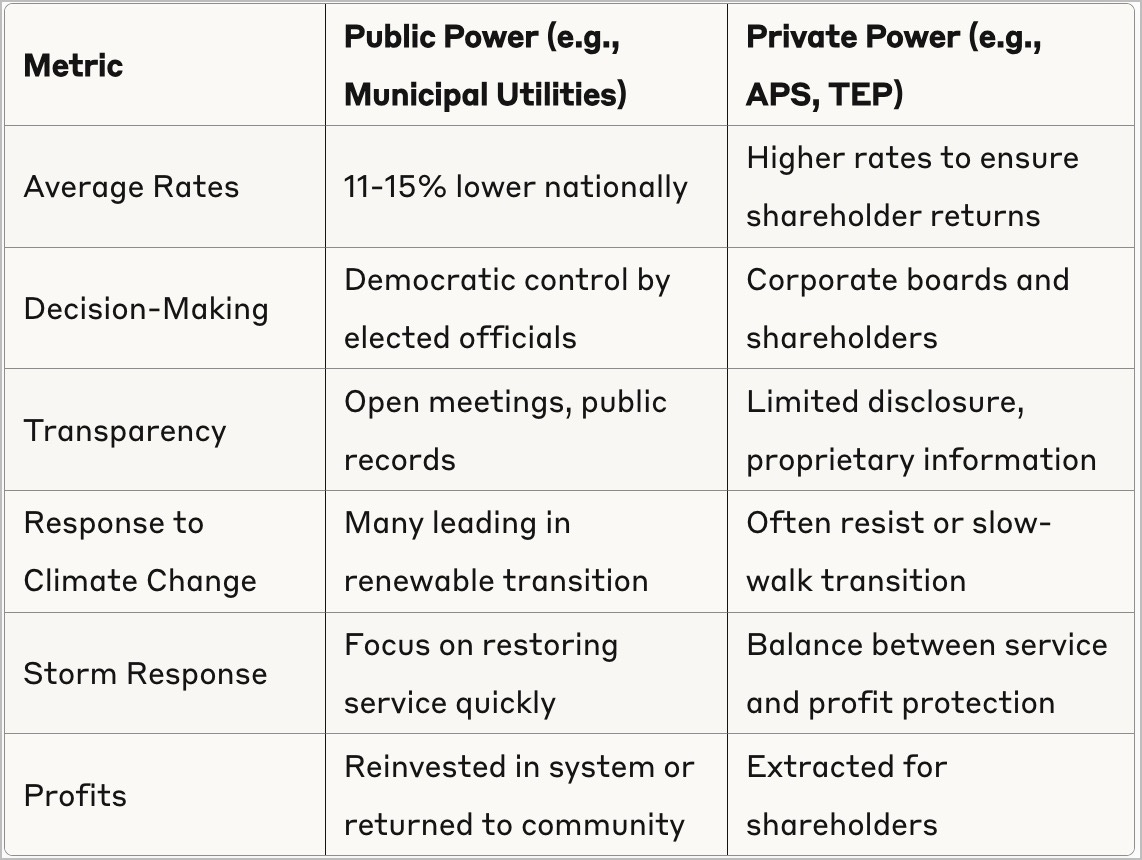💰 Desert Sellout: How Katie Hobbs Handed APS a Billion-Dollar Gift at Your Expense
When it comes to corporate power grabs, the letter next to a politician's name means nothing. HB2679 exposes how utilities purchase both parties while Indigenous and poor communities pay the price.
This isn't just bad policy – it's colonial extraction in modern form. These corporations treat our communities as resource colonies, using our land, polluting our air and water, and extracting wealth from our people to enrich distant shareholders and executives.
😽 Keepin’ It Simple Summary for Younger Readers
👧🏾✊🏾👦🏾
🔌 Arizona's biggest electric company, APS, just 🤝 convinced Governor Katie Hobbs to sign a law that lets them 🛡️ avoid paying for damages if their equipment causes 🔥 wildfires. 💸 The law also allows them to make customers pay for APS's business mistakes through higher bills. 🏭 It doesn't require APS to switch to cleaner energy, so they can keep running polluting power plants that harm people's health, especially in 🏘️ Native American and Latino communities.
Meanwhile, in Cleveland, a young mayor named Dennis Kucinich 💪 refused to sell their public power company despite enormous pressure. 📊 Today, Cleveland residents save millions on their bills because of his stand. 💡 Tucson could do the same by taking over TEP and controlling our energy future. 🌍
🗝️ Takeaways
💸 Governor Katie Hobbs signed HB2679, allowing APS to shift debt to ratepayers while gaining immunity from wildfire liability lawsuits, showing how "progressive" Democrats often serve corporate masters.
🏭 The bill extends the lifespan of polluting coal plants with no requirements for a clean energy transition, primarily harming Indigenous communities and communities of color.
🤝 Former APS lobbyists now hold key positions in Hobbs' administration, highlighting the revolving door between regulators and the utilities they supposedly oversee.
📊 Dennis Kucinich's story from Cleveland proves public power works – saving residents millions while providing democratic control over essential infrastructure.
🌱 Tucson has an opportunity to follow Cleveland's example by municipalizing TEP, which would lower rates, create good jobs, and accelerate our transition to renewable energy.
Corporate Puppetry 101: How APS Bought Their Way to Legal Immunity under Democrat Katie Hobbs
Beneath the scorching desert sun, the ancient dance continues—the rhythm of money drowning out the heartbeat of the people.
If you've ever wondered how a corporation buys legal immunity, pull up a chair, pour yourself some strong coffee, and let me tell you a story about power, money, and how both political parties bow to corporate interests while claiming to serve the people.
Arizona Public Service Co. (APS), our state's largest electricity provider, just secured a massive victory in the Arizona legislature. With Governor Katie Hobbs' signature, they've won a legal shield that protects them from wildfire liability while simultaneously gaining the ability to offload their financial mistakes onto ratepayers—that's you and me, amigos.
The Corporate Shell Game: Understanding HB2679
House Bill 2679, recently signed into law by Democratic Governor Katie Hobbs, allows utilities to refinance certain debts through low-interest bonds using a financial mechanism called "securitization." This is being sold to us as a way to "reduce costs for customers" by lowering the financing expenses utilities face.
According to Arizona Capitol Times, the bill requires utilities to seek approval from the Arizona Corporation Commission (ACC) before proceeding with any securitization transaction. The ACC, which is completely Republican-run, must determine that the transaction is just, reasonable, and in the public interest and will save customers more than traditional financing methods.
Sounds good, verdad? But let's dig deeper.
Critics, including Democratic legislators and former Arizona Corporation Commission members, contend that the bill lacks sufficient safeguards and accountability measures for utilities, enabling corporate mismanagement without real consequences. According to the concerns raised by Blog for Arizona, this bill prioritizes utility profits over consumer protection, forcing ratepayers to pay off utility mistakes via bonds.
Think of it as a corporate version of "heads I win, tails you lose." APS makes a bad investment? No problem—you'll pay for it. APS fails to properly maintain its infrastructure, which causes a wildfire? Again, your problem, not theirs.
Follow the Money: APS's Political Influence Machine
We must follow the money to understand how this bill passed despite serious concerns. APS has developed a sophisticated political influence operation that spans both parties.
The corporation engages in extensive lobbying and community donations to cultivate favor among politicians and the public. They make substantial donations to support various initiatives, creating a network of political debts that can be called in when needed.
And when it comes to Governor Hobbs specifically? Let's just say the relationship between our "progressive" governor and APS isn't exactly arms-length. Hobbs has received significant support from APS and its affiliates during her campaign and since taking office.
Arizona Public Service (APS), through its parent company Pinnacle West Capital Corp., has made substantial financial contributions benefiting Governor Katie Hobbs. Notably:
APS donated $250,000 to Hobbs’ inaugural fund in 2023, making it the largest single donor to her inauguration.
Pinnacle West also contributed $100,000 to a special legal defense fund set up by Hobbs to cover legal fees from election-related lawsuits. This donation was only disclosed because APS is required by the Arizona Corporation Commission to report such contributions; otherwise, the fund and its donors would have remained secret due to a legal exemption in Arizona’s campaign finance laws.
Additional direct campaign donations from APS’s PAC to Hobbs’ campaign totaled at least $10,600 in 2022, with further contributions in subsequent years.
Source: APS donated $250,000 to Gov. Hobbs after trying to defeat her
Campaign finance records reveal that APS executives and their political action committees contributed substantially to Hobbs' campaign. Even more telling, several former APS lobbyists now hold key positions within the Hobbs administration, creating a revolving door between the regulator and the regulated. This is the same playbook utility companies have used for decades – infiltrate both parties, hedge their bets, and ensure they win regardless of which party takes power.
Since her election, Hobbs has attended multiple private events sponsored by APS, including fundraisers where the utility company's executives had exclusive access to her.
These aren't coincidences – they're strategic investments in political capital that have now paid off handsomely with the signing of HB2679.
The Environmental Betrayal
Environmental advocates have raised serious concerns that HB2679 could provide a financial lifeline to polluting coal industries. As reported in a press conference held by Democratic Senators highlighting the dangers of HB2679, the bill could potentially increase pollution by making it easier for utilities to keep coal-fired power plants operational instead of facilitating their retirement.
The bill does not limit securitization to retiring assets, which undermines its potential as a tool for promoting clean energy and a just transition for affected communities.
For those of us whose ancestors have lived on this land since time immemorial, this represents yet another broken promise about protecting the earth for future generations, including the seventh generation from now.
Environmental justice communities, particularly Indigenous and Latinx communities near fossil fuel infrastructure, bear the disproportionate burden of this policy. The toxic emissions from these plants don't blow toward Scottsdale mansions – they drift over the colonias and reservations where my people have been systematically pushed.
Public Power: A Better Path Forward
What makes this betrayal even more frustrating is that we have models of a better approach right in front of us. The story of former Cleveland Mayor Dennis Kucinich offers a powerful counter-narrative to the privatization gospel preached by corporate interests.
In the late 1970s, Kucinich faced immense pressure to sell Cleveland's public power utility, known as Muny Light, to private interests. Despite facing political isolation, media attacks, assassination attempts, and even forcing the city into default, Kucinich refused to sell. He recognized what we in Arizona should understand: when you control your own power, you control your destiny.
Today, that same utility (now called Cleveland Public Power) continues to save residents millions annually through competitive rates that keep the private utility in check. The city ultimately vindicated Kucinich's stand, recognizing that he sacrificed his political career to protect the public interest.
Tucson faces a similar opportunity. Like APS, Tucson Electric Power (TEP) is a private utility that prioritizes shareholder returns over the public good.
Municipal ownership of TEP would allow the city to:
Lower rates for residents and businesses
Accelerate the transition to renewable energy on the community's timeline, not a corporation's
Keep profits in the community rather than sending them to distant shareholders
Create good-paying union jobs with local accountability
Ensure democratic control over essential infrastructure
Studies of publicly-owned utilities consistently show they provide more reliable service at lower costs while transitioning to renewables faster than their private counterparts. During disasters, public utilities restore power quicker because they answer to the community, not shareholders demanding a profit margin.
The Financial Long Game
Some critics liken the securitization mechanism to a "Ponzi scheme," arguing that it pays off old debts with new charges, locking ratepayers into decades of payments without addressing the root causes of utility debt.
As the Arizona Public Health Association put it, this is "a reckless bill to foist utility debt on the public." The process is essentially a financial shell game that guarantees profits for utilities and Wall Street investors while leaving ratepayers saddled with long-term obligations.
This isn't just bad policy – it's colonial extraction in modern form. These corporations treat our communities as resource colonies, using our land, polluting our air and water, and extracting wealth from our people to enrich distant shareholders and executives.
The False Promise of Bipartisanship
Proponents of HB2679 tout its "bipartisan" support as evidence of its merit. However, when both parties receive corporate money, bipartisanship becomes a shield for corporate interests rather than a sign of sound policy.
As my abuela would say, "Cuando el río suena, agua lleva." When the river makes noise, it carries water. And in this case, the noise of bipartisan agreement carries the water of corporate influence.
Opposition does exist, especially from environmental and consumer groups, due to concerns about pollution, corporate influence, and consumer costs. Representatives like Sandy Bahr of the Sierra Club and Senator Priya Sundareshan have voiced strong opposition, highlighting the disproportionate impact of APS's legislative influence.
Governor Hobbs has argued that the legislation could lower costs and improve grid resiliency. But the question remains: lower costs for whom? Improved grid resiliency at what environmental cost? And who bears the burden when the strategy fails?
Environmental Justice and the Disproportionate Impact
For Indigenous communities and communities of color in Arizona, environmental injustice is nothing new. We've lived with the health impacts of extractive industries and pollution for generations. HB2679 continues this pattern by failing to ensure that the communities most impacted by pollution will see benefits.
The bill lacks any provision for a just transition for workers and communities dependent on fossil fuel industries. There's no guarantee that the utilities will actually retire their polluting assets or that the financial benefits of securitization will flow to the communities that have borne the brunt of environmental harm.
This is particularly concerning for communities near the Four Corners Power Plant and other coal-fired facilities that may now receive an extended lease on life rather than transitioning to cleaner alternatives.
The Data Tells the Story
Let's look at some key data points that illustrate the real impact of HB2679:
Table 1: Who Bears the Costs and Benefits of HB2679
Table 2: Comparing Public vs. Private Power Systems
Democratic Complicity in Corporate Power
It's important to note that while this Substack frequently critiques the Trump administration and Republican policies, corporate capture of our democracy is a bipartisan problem.
Governor Katie Hobbs, a Democrat, signed these bills despite significant opposition from environmental and consumer advocates within her own party.
This illustrates a painful truth: both major parties are often more loyal to corporations, power, and money than to the people they serve. While their rhetoric and approaches may differ, the end result—prioritizing corporate interests over people and the environment—remains disturbingly consistent.
As we navigate the Trump era with its blatant attacks on civil rights, immigration, the environment, and Indigenous sovereignty, we must also hold Democrats accountable when they fail to stand firm against corporate power.
Resistance and Hope: Where Do We Go From Here?
Despite this setback, there are reasons for hope and clear paths for resistance:
1. Demand ACC Oversight
The law requires Arizona Corporation Commission approval for securitization transactions. We must pressure the ACC to implement strict oversight and reject any transactions that don't genuinely benefit ratepayers or extend the lives of polluting facilities.
2. Support Community Power Initiatives
Community-owned renewable energy projects offer an alternative to monopoly utilities. By supporting these initiatives, we can build resilience in our communities while reducing dependence on corporations like APS.
3. Electoral Accountability
Remember which politicians supported this corporate giveaway when election time comes. While both parties may be susceptible to corporate influence, some politicians still stand firm for people and the environment.
4. Build Environmental Justice Coalitions
The fight against HB2679 brought together environmental groups, consumer advocates, and justice-oriented lawmakers. We need to strengthen these coalitions and ensure that Indigenous voices and perspectives from communities most impacted by environmental harm are centered in policy discussions.
5. Start a Public Power Movement in Tucson
Drawing inspiration from Cleveland and other successful public power cities, we should begin organizing for municipal ownership of Tucson Electric Power. This won't be quick or easy – the utility will fight with everything they have – but the long-term benefits for our community would be transformative.
Start by joining community groups that are already working on energy democracy and environmental justice. Contact your city council members and ask them to commission a feasibility study on municipal acquisition of TEP. Talk to your neighbors about the benefits of public power. Remember, Cleveland started its public utility with a small system that grew over time—we can do the same.
La lucha sigue—the struggle continues. But we continue it together, drawing strength from the resilience of our communities and the wisdom of our ancestors who sustained this land for generations before corporations existed.
Stay Informed and Take Action
If you want to stay informed about corporate influence in Arizona politics and join the resistance, consider supporting the Three Sonorans Substack. Your subscription helps us continue our independent reporting on issues that mainstream media often ignore.
Beyond financial support, your engagement matters. Share this information with your networks, attend ACC hearings when securitization proposals are considered, and join local environmental justice organizations fighting for a cleaner, more just Arizona.
El pueblo unido jamás será vencido—the people united will never be defeated. But unity requires information, and information requires independent media that isn't beholden to corporate interests.
What do you think?
What do you think about the potential for public ownership of utilities in Arizona? Is Tucson ready to follow Cleveland's example and take control of its energy future?
How can we build stronger coalitions between environmental justice communities and labor unions to ensure a just transition away from fossil fuels?
- Three Sonorans
Have a scoop or a story you want us to follow up on? Send us a message!









